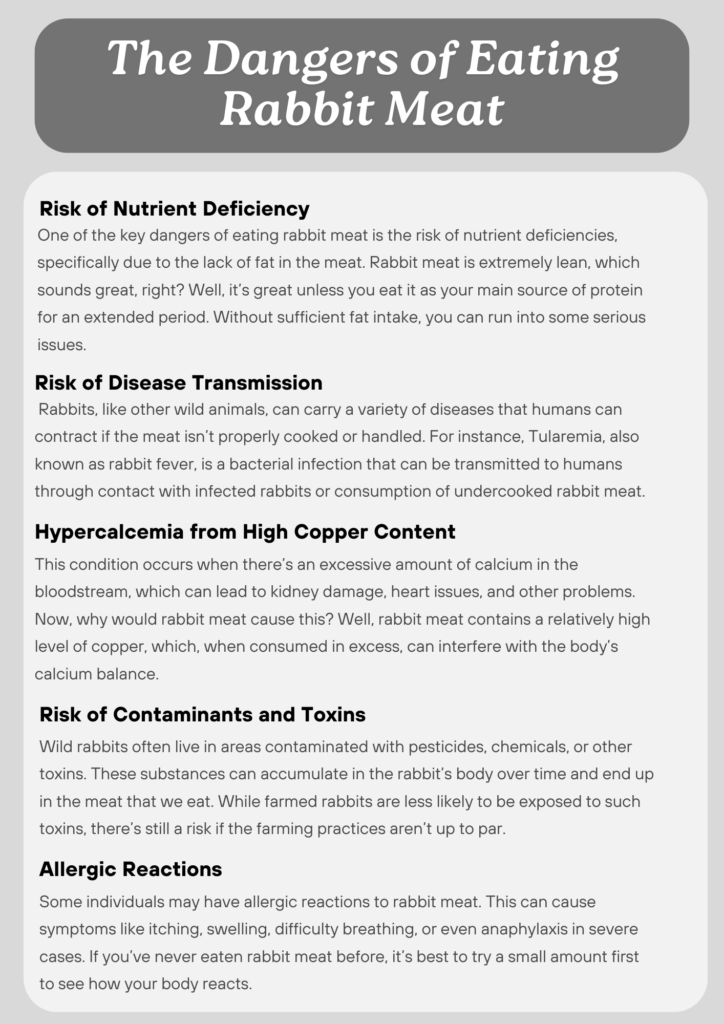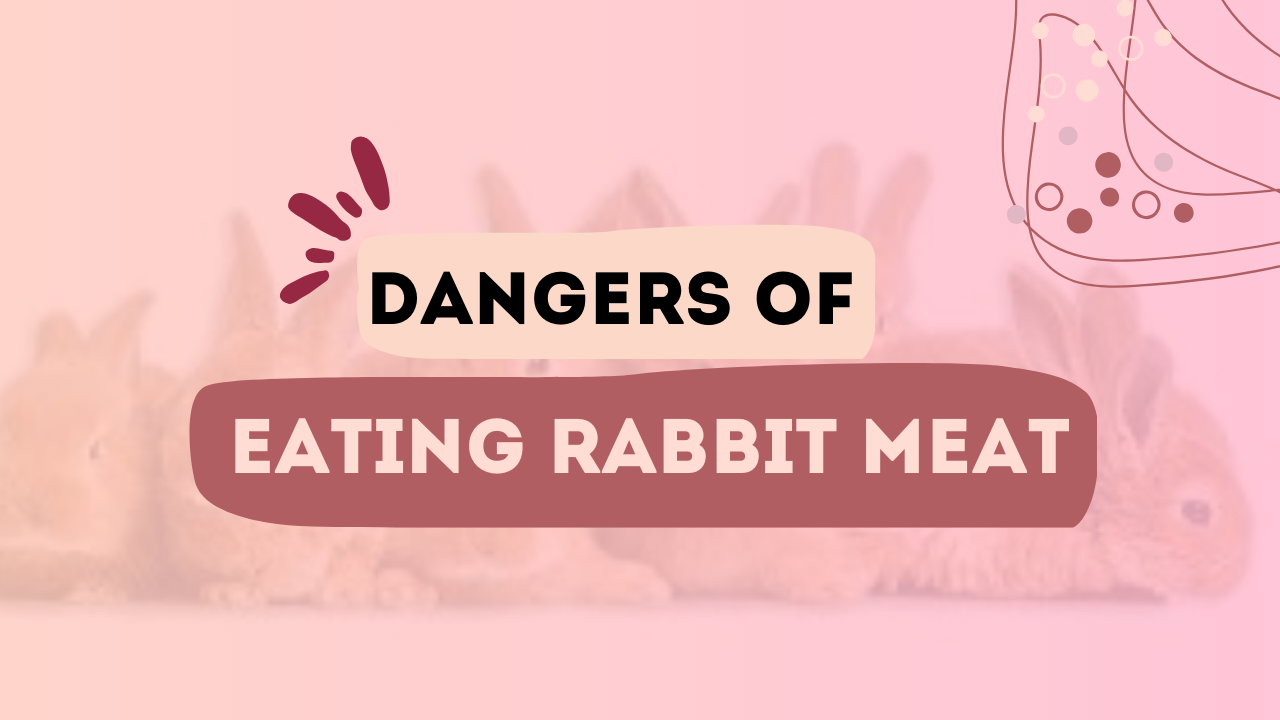When it comes to rabbit meat, some people might consider it a lean, healthy alternative to beef or chicken. It’s low in fat, packed with protein, and can be a tasty meal for those who enjoy game meats. But like with any food, there’s always a flip side. Eating rabbit meat, especially if it’s not prepared properly, can come with certain health risks. While rabbit meat itself isn’t inherently dangerous, there are some potential hazards that consumers should be aware of. Let’s dive in and talk about the possible dangers of eating rabbit meat that could catch you off guard. After all, we don’t want a delicious meal to end up being a health nightmare, right?
1. Risk of Nutrient Deficiency
One of the key dangers of eating rabbit meat is the risk of nutrient deficiencies, specifically due to the lack of fat in the meat. Rabbit meat is extremely lean, which sounds great, right? Well, it’s great unless you eat it as your main source of protein for an extended period. Without sufficient fat intake, you can run into some serious issues. It’s not that rabbit meat is bad, but eating too much of it can lead to a condition known as rabbit starvation or protein poisoning. This happens because your body needs fats for energy and to absorb essential vitamins, and rabbit meat just doesn’t provide enough of that.
When someone is on a rabbit-only diet, they might experience symptoms like nausea, dizziness, fatigue, and even diarrhea. It’s basically a sign that you’re not getting all the essential nutrients your body needs. It’s a condition that might not be obvious at first, but trust me, you’ll notice it if you go overboard with rabbit meat consumption. Balance is key!
2. Risk of Disease Transmission
Another concern with eating rabbit meat is the potential for disease transmission. Rabbits, like other wild animals, can carry a variety of diseases that humans can contract if the meat isn’t properly cooked or handled. For instance, Tularemia, also known as rabbit fever, is a bacterial infection that can be transmitted to humans through contact with infected rabbits or consumption of undercooked rabbit meat. Symptoms of Tularemia include fever, chills, fatigue, and swollen lymph nodes. If left untreated, this illness can become serious and even life-threatening.
Properly cooking the rabbit meat can kill the bacteria and reduce the risk significantly. However, consuming raw or undercooked rabbit meat is definitely not a good idea. Make sure to cook rabbit thoroughly to avoid such risks. And don’t forget to wash your hands and utensils after handling raw meat, especially if you’re dealing with wild rabbits.
3. Hypercalcemia from High Copper Content
One thing that’s not talked about enough when it comes to rabbit meat is the potential for hypercalcemia. This condition occurs when there’s an excessive amount of calcium in the bloodstream, which can lead to kidney damage, heart issues, and other problems. Now, why would rabbit meat cause this? Well, rabbit meat contains a relatively high level of copper, which, when consumed in excess, can interfere with the body’s calcium balance.
While you’d have to eat quite a bit of rabbit meat to reach this point, it’s still something worth noting, especially for those who already have kidney problems or other related conditions. In general, rabbit meat should be eaten in moderation, like with any other meat, to avoid such issues.

4. Risk of Contaminants and Toxins
Another issue to think about when consuming rabbit meat is the environment in which the rabbit lived. Wild rabbits often live in areas contaminated with pesticides, chemicals, or other toxins. These substances can accumulate in the rabbit’s body over time and end up in the meat that we eat. While farmed rabbits are less likely to be exposed to such toxins, there’s still a risk if the farming practices aren’t up to par.
For this reason, it’s essential to buy rabbit meat from a trusted source, whether that’s a reputable farm or a local butcher. If you’re hunting wild rabbits, make sure you know the area and the risks involved. Consuming meat from animals exposed to environmental toxins can lead to various health issues, from gastrointestinal problems to more serious long-term effects.
5. Allergic Reactions
Although rare, some individuals may have allergic reactions to rabbit meat. This can cause symptoms like itching, swelling, difficulty breathing, or even anaphylaxis in severe cases. If you’ve never eaten rabbit meat before, it’s best to try a small amount first to see how your body reacts. Just like with any new food, your immune system might not be used to it, and an allergic reaction could occur. If you have a known allergy to other types of meat, like chicken or beef, you should be extra cautious when introducing rabbit meat into your diet.
6. The Danger of Parasites
Just like with other wild game, rabbit meat can sometimes carry parasites. Cysticercus is a type of tapeworm that can be found in rabbits. While cooking meat at the right temperature usually kills most parasites, it’s important to make sure your rabbit meat reaches the correct internal temperature to ensure safety. Undercooked or raw meat poses a much higher risk of transmitting parasites. So, if you’ve been considering making a rabbit stew or roasting a rabbit leg, just remember to check that the meat has been thoroughly cooked.
Conclusion: How to Safely Enjoy Rabbit Meat
So, to wrap it up: rabbit meat can be a great addition to your diet if prepared and consumed properly. But it’s important to be aware of the potential risks, whether it’s nutrient deficiencies, disease transmission, or contaminants in the meat. To safely enjoy rabbit meat, make sure it’s cooked thoroughly, sourced from a reliable supplier, and eaten in moderation. If you’re unsure about anything, don’t hesitate to consult with a healthcare provider or nutritionist, especially if you’re thinking of making rabbit meat a regular part of your meals.
As with any food, it’s all about balance. Don’t go overboard on rabbit meat, and always take the necessary precautions to ensure it’s safe to eat. After all, eating should be an enjoyable experience, not a health hazard!

